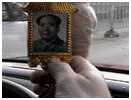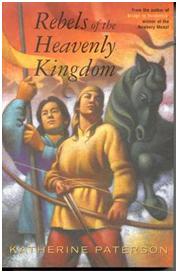 I recall a small, but significant moment in a taxicab ride in Changsha about twelve years ago. My oldest daughter and I had been in Changsha, Hunan Province for about a week, and I had noticed that every cab we got into had a pendant hanging from the rearview mirror with a portrait of Mao in a red-and-gold frame.
I recall a small, but significant moment in a taxicab ride in Changsha about twelve years ago. My oldest daughter and I had been in Changsha, Hunan Province for about a week, and I had noticed that every cab we got into had a pendant hanging from the rearview mirror with a portrait of Mao in a red-and-gold frame.
The cult of Mao had largely receded in the rest of China. The only place to find copies of The Little Red Book of Chairman Mao was at flea markets and souvenir shops. So I asked our driver why every taxi cab had a picture of Mao hanging from the rearview mirror. His reply startled me. He explained that the cab drivers believed Mao had proved himself to be a powerful figure – in fact, more powerful than the older, more traditional local gods and Buddhas of China. After all, explained the driver, he had challenged all of the older gods – closed their temples, attempted to rid China of superstition – and yet had not been struck down. Mao had, in fact, lived a long, full life. Ergo, he must be more powerful than all of the gods he had challenged and beat.
Thus, the taxicabs all had a picture of Mao as a sort of talisman – to invoke his spirit and power for protection and favor.
Changsha is in the south of China. It is the capital of Hunan province, Mao’s home. The taxicabs in Beijing, far to the north, do not show the same universal reverence for his image.
I mention this as a way to introduce two books on China, one just re-published, which I recommend.
 The first is Rebels of the Heavenly Kingdom by Katherine Paterson. Paterson is one of the most gifted authors of children’s books over the past 50 years. She has twice won the Newbery Award (in 1977 for Bridge to Terabithia, and in 1981 for Jacob Have I Loved). Paterson was born in China and spent her early childhood there.
The first is Rebels of the Heavenly Kingdom by Katherine Paterson. Paterson is one of the most gifted authors of children’s books over the past 50 years. She has twice won the Newbery Award (in 1977 for Bridge to Terabithia, and in 1981 for Jacob Have I Loved). Paterson was born in China and spent her early childhood there.
In 1983, she published Rebels of the Heavenly Kingdom, which is a historical novel set in the years 1850 to 1853. The backdrop is the great Taiping Rebellion – a civil war which rocked China for 14 years and left 20 to 30 million dead. It is the American Civil War times twenty. It is almost unknown outside of China. Americans are preoccupied with the history of our own Civil War (which occurred at almost the same time).
The Taiping Rebellion was led by Hong Xiuquan (in Paterson’s novel referred to as Hung Hsiu-Ch’uan). In China the family name is the first character and is usually the shorthand way to refer to someone. Hong (or Hung) lived at the time and place where western missionaries were first entering China and making the first attempts to translate the Bible into Chinese. Hong was a young 22 year old teacher and student when he first encountered translations and summaries of the Bible in Chinese. Over the next several years, he had a series of vivid dreams in which he saw Confucius being punished for not teaching about the one God, and saw God the Heavenly Father on his throne, with Jesus standing beside him. In his dreams, Hong reported that they commissioned him to rid China of demon worship. Hong began to preach throughout the county where he lived, gained a following, and followed through on his exhortations by destroying idols and temples throughout the countryside.
Paterson’s novel opens as a young boy (Wang Lee) is kidnapped from his impoverished rural village by bandits (former soldiers, deserters from the Imperial army) and then sold into slavery, only to be purchased by a kindly young gentleman who turns out to be a follower of Hong and part of a rebel group. Actually, the young gentleman turns out to be a young lady, Mei Lin, who in a very effective disguise had been recruiting followers for the Way of Heavenly Peace (the Taiping).
The rest of the novel is the odyssey of these two improbable friends and followers of Hong (Wang remains skeptical, Mei Lin is more fervent) as the Taiping Rebellion grows, fights and defeats the Imperial armies, and eventually captures the important Imperial capital city of Nanking and makes it the center of their Heavenly Kingdom. The horrors of war are real and grim. There is death, both in battle and from intrigue. Soldiers and civilians are killed. The strange religious teachings of Hong are taught and repeated throughout the Heavenly Army. So strange, so similar to the teachings of the Bible and yet so tragically different and misused by the leaders of the Taiping.
The book has a reassuring, if slightly improbably ending. But after all the horrors that Wang and Mei Lin experience (both together and apart), it seems churlish to begrudge them some measure of happiness. Some of the incidents, implied and alluded to, will be disturbing to some readers. They should be disturbing. The realities of war and rebellion (and this particular war and rebellion) cannot be glossed over. In the end, to have read this book (and to have re-read it now ten years later) is to understand China and the Chinese reaction and reception to Christianity perhaps a bit better. The first encounter went so tragically awry. The subsequent events of the 20th century, from the violent attacks on Christians in the Boxer Rebellion of 1900 to the expulsion of all western missionaries by Mao’s People’s Republic in the 1950’s are in part explained by the horrible consequences of China’s first encounter with Christianity.
The survival and explosive growth of the Chinese house church movement in the 1970s and later is all the more remarkable, and all the more unexpected, given what had preceded it.
 What is also remarkable is that Paterson crafted her tale 13 years before Jonathan Spence published his award-winning history of Hong Xiuquan in 1996: God’s Chinese Son.
What is also remarkable is that Paterson crafted her tale 13 years before Jonathan Spence published his award-winning history of Hong Xiuquan in 1996: God’s Chinese Son.
I read Spence’s history of the leader of the Taiping rebellion when it was published, and then had the great good fortune to be able to visit the palace of Hong Xiuquan in Nanjing in 1999 when my oldest daughter and I journeyed to China to complete the adoption of our daughter Sarah. We had quite an adventure attempting to navigate Nanjing completely on our own and were astonished to discover that we were the only westerners in Nanjing visiting the museum on that particular day.
The entrance to the Taiping palace is dominated by a large bust of Hong Xiuquan. The Chinese communists judge him favorably for having led an early rebellion against the Imperial government of the Manchu. They largely gloss over the religious dimensions of the rebellion.
I commend both of these books to anyone who has an interest in China and who wishes to understand China better, especially the difficult history of Christianity in China.
Paterson’s tale is haunting and personal. The events of the rebellion seen through the eyes of two young people. It would be a thought-provoking read for students high school up through adult.
Spence’s history has a bit more emotional distance, but is a riveting tale none-the-less. Western missionaries were puzzled by Hong – and could not quite decide whether to endorse and encourage him for his appreciation of God and invocation of Jesus as God’s son, or to denounce and reject him for his heretical, megalomaniacal pronouncement that he himself was Jesus’ younger brother. 150 years later, it is still difficult to understand Hong Xiuquan and to decide what to make of him.
Rebels of the Heavenly Kingdom, by Katherine Paterson, has just been re-released after being out of print for a number of years. It is a 263 page paperback and sells for $12.95.
God’s Chinese Son, by Prof. Jonathan
Spence,
remains in print, 12 years after it was first published. It is a paperback, 430 pages and sells for $17.95. Either (or both) can be purchased directly from Greenleaf Press by clicking the links in this review. Or you can browse the selection of books on China on our website.
– Rob Shearer, Publisher
Greenleaf Press
PS: Readers of this review may receive a 10% discount on the purchase of either or both of these books by entering the coupon code CHINA during the checkout process. The coupon can only be redeemed once per customer.